Newsletter September 2016
 ICRH Global Newsletter ICRH Global Newsletter 23rd of September, 2016
|
Academic Network on Sexual Health and Rights Policy (ANSER) On 30 November, ANSER will be officially launched in Gent. This event will be followed immediately by an international conference on 1 and 2 December. On 30 November, ANSER will be officially launched in Gent. This event will be followed immediately by an international conference on 1 and 2 December.The ANSER network unites 17 academic institutions from around the world and is funded by Ghent University and coordinated by ICRH. Speakers at the launch event will include Elke Sleurs (Belgian State Secretary for Science Policy) and Neil Data (Secretary of the European Parliamentary Forum on Population & development). The purpose of the conference is to present research results in the field of SRHR, discuss their implications for policy and link researchers with policy makers. The conference is open to all researchers, policy makers, students and others that are interested in SRHR policy research. You can register for the launch and the conference on: https://congres.ugent.be/SRHR2016. More information: anser@ugent.be ANSER website: http://www.ugent.be/anser/en |
| Call for abstracts Within the context of the ANSER conference (see above) we are inviting colleagues and students from universities and organisations worldwide to present their research on sexual and reproductive health and rights. The presentations have to address a topic related to SRHR and should make a link to policy. The best abstracts will be selected for oral and poster presentation. Abstracts should be limited to maximum 2,000 characters and follow this structure: →Title, authors, affiliation →Background / problem statement →Objectives →Methods →Results →Conclusions/Discussion →Key words: 3-5 Abstracts have to be submitted to anser@ugent.be before 15 October 2016. A scientific committee of senior experts from Network member institutions will conduct a peer review and the final selection of the posters will be announced before 31 October 2016. More information: anser@ugent.be |
| PROJECTS |
| Visualisation of methylation patterns ICRH Belgium received an Industrial Research StarTT Valorisation grant for the project entitled ‘Methylation in situ hybridization: visualization of methylation patterns using UPSAS (uniprobe signal amplification system)’. The technology allows visualisation of DNA or RNA within cells, using specifically designed probes. The aim of the project is to perform a verification study of this new technology as potential diagnostic or prognostic method for breast cancer, prostate cancer, melanoma and cervical cancer. The project will be performed in collaboration with the department of Medical Oncology (UZGent), Department of Pediatrics and Genetics, the department of Bioscience engineering and is supported by the BIOMARKED valorisation consortium. The project started on 1 September. More information: Marusya.lieveld@ugent.be |
| Prevalence of FGM in Europe On May 26th 2016 ICRH obtained a no-cost extension for the project Towards a better estimation of prevalence of female genital mutilation in the European Union (FGM-PREV). Organizational difficulties caused some delay in the project activities, and therefore some corrective measures needed to be taken. Apart from the extension of the project period, it was decided that the fieldwork would be done in Belgium instead of France. For Belgium, a first group of interviewers has been trained in June and organizations who are working with the target group (i.e. women from a selection of countries where FGM is practiced) were contacted. The aim of the project is to develop a common definition on FGM prevalence, a common methodology and minimum standards for prevalence estimates of FGM in the EU, in order to generate comparable data. The project is funded by the DAPHNE program of the European Commission and is conducted in collaboration with the Institut National d’Etudes Démographiques in Paris and The Department of Sociology of the Università degli Studi di Milano-Bicocca in Italy. Also in Italy the fieldwork started in June. Because of summer holidays and Ramadan, it proved to be difficult to meet potential respondents. The fieldwork will end by November 15th 2016. Results are expected in early 2017. More information: Els Leye, els.leye@ugent.be |
| Staff motivation and contraception stock-outs The report of the project ‘Enhancing motivation of family planning service providers as a lever to avoid stock-outs and increase quality of service’ has been published. A crucial but seldom considered building block in optimizing health care logistics and family planning services is the human factor: the degree to which staff are motivated and feel responsible for delivering high quality services and meeting customer’s needs and expectations. ICRH explored how and to what extent the motivational factor of family planning service and commodity provision can be optimized, and the impact this can have on avoiding stock-outs. This research took place in 15 primary health care facilities in Maputo Province, Mozambique, through implementation of different motivational interventions and evaluating their impact on motivation, and by measuring the impact of motivation on good supply management. The project was funded by PATH on behalf of the Reproductive Health Supplies Coalition. The report is available here, and a policy brief that was based on the findings can be accessed in English here and in Portuguese here. |
ELIMIKA Project Adolescents and youth taking control of their HIV treatment issues in Mombasa, Kenya Adolescents and youth taking control of their HIV treatment issues in Mombasa, KenyaThe main objective of the study was to improve adherence to HIV treatment and support for adolescents and youth by setting up a digital peer support system. A web application was developed driven by A-Ys’ and health workers’ The website was in English but allowed both English and Swahili posts; it was made accessible anywhere and in any internet device like smartphones with strict security, Videos and Chats. Participants had the ability to create groups & schedule counselling with experts in the study. It was an interesting study as young people living with HIV could open up on issues to do with adherence and relationships. After interacting with the platform, the self-reported responses were that they were more likely to improve their ART uptake and had increased confidence that they will adhere to their medication even in schools and other social events. The reported responses will be confirmed in stage two of the study yet to be awarded. More information: Jefferson Mwaisaka jefferson@icrhk.org or Peter Gichangi peter@icrhk.org. |
BORESHA Project |
| Posters presented at the 21th International AIDS Conference: THPEC152 ”Not what we agreed: examining male sex workers´ experiences of physical and sexual violence from their clients in Mombasa, Kenya" J.E. Mantell, T.B. Masvaure, J.U. Tocco, T. Sandfort, S.V. Chabeda, A. Restar, P. Gichangi, Y. Lafort THPED290 "Perceptions of sexual and gender-based violence by female sex workers and male clients in Mombasa, Kenya" S.V. Chabeda, P. Gichangi, A. Restar, J.U. Tocco, T.B. Masvaure, T. Sandfort, J.E. Mantell, Y. Lafort WEPED390 ""Yes, I would like to use them, because sex is my work": awareness of and willingness to use PrEP and PEP among female and male sex workers in Mombasa, Kenya" A. Restar, Y. Lafort, J. Tocco, P. Gichangi, T. Masvawure, J. Mantell, S. Chabeda, T. Sandort THPED357 “Who dunnit?: Intentional and unintentional condom breakage in sexual interactions between female and male sex workers and their clients in Mombasa, Kenya” T.B. Masvawure, J. Mantell, J. Tocco, P. Gichangi, A. Restar, S. Chabeda, Y. Lafort, T. Sandfort |
Testing mobile sexual and reproductive health messages for adolescents in Kenya Message development committee |
| EVENTS |
ICRH Mozambique annual meetings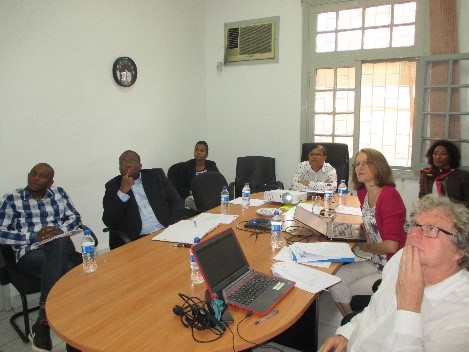 On 15 September, the institutional meetings of ICRH Mozambique took place in Maputo On 15 September, the institutional meetings of ICRH Mozambique took place in MaputoICRH Mozambique is a Mozambican nonprofit association of scientific character, with legal personality and administrative, financial and patrimonial autonomy. It is governed by a Scientific Council and a General Assembly. Both institutional bodies met on 15 September in ICRH’s offices in Maputo, with some members participating through Skype. At these meetings, the financial statements of the past year and the projections for the coming year were reviewed, an update on ongoing and upcoming projects was given and the general strategy of the organization was discussed. The meeting was presided over by the chairperson Orquidéa Massarongo-Jona. |
Global Early Adolescent Study (GEAS) results presented at Young Lives Conference in Oxford On 8th and 9th September 2016 ICRH researcher Sara De Meyer presented qualitative results of GEAS at the ‘Adolescence, Youth and Gender Conference’. On 8th and 9th September 2016 ICRH researcher Sara De Meyer presented qualitative results of GEAS at the ‘Adolescence, Youth and Gender Conference’.The presented research about perceived risks for boys’ and girls’ health when entering adolescence and on gender norms in early adolescents’ romantic relationships indicate the need for more research on how gender norms in early adolescence can influence sexual and reproductive health and wellbeing in a later stage of adolescence. The GEAS consortium is looking for funding to investigate this research question by implementing a longitudinal cohort study in 15 countries. More information about the conference: https://twitter.com/@YLoxford, https://www.youtube.com/channel/UCsZkpcrrolOvnzNG2X3lIjg More information about the Global Early Adolescent Study (GEAS): www.geastudy.org More information about the GEAS study in Belgium: SaraA.DeMeyer@UGent.be |
National Adolescent Sexual and Reproductive Health Policy Launch in Kenya picture: peer educators during the launch of the ASRH policy in Kilifi County |
Kenyatta University MPH students’ visits Kenyatta University MPH students attending a session at the ICRHK boardroom |
| ICRH PEOPLE |
Jin-Lin Liu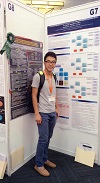 Jin-Lin came to ICRH Belgium as a visiting PhD scholar from Xi’an Jiaotong University in China Jin-Lin came to ICRH Belgium as a visiting PhD scholar from Xi’an Jiaotong University in ChinaJin-lin Liu is staying at ICRH from September 2016 until February 2017, within the context of an exchange project between ICRH and Xi’an Jiaotong University. He is a PhD Candidate in health policy and health system from the School of Public Policy and Administration, Xi’an Jiaotong University. During his stay in Gent he will perform activities related to the project ‘Impact of the universal new two-child policy on the healthcare system in China - a case study in Xi’an’, supervised by ICRH senior researcher Dr. Wei-Hong Zhang. More information: Jinlin.Liu@UGent.be |
Patrick Li, Hon-chung Patrick has joined ICRH Belgium since August 2016 as a research assistant of the INPAC project. Patrick has joined ICRH Belgium since August 2016 as a research assistant of the INPAC project. Patrick was born in Hong Kong and has only relocated to Belgium with his partner last year. He has obtained a bachelor’s degree in Social Science (Communication) from Hong Kong Baptist University and a master degree in Fine Arts (Playwriting) from The Hong Kong Academy for Performing Arts. In addition to his 10 year+ working experience as researcher/creative writer/ coordinator along with various media corporates and institutes, Patrick was also been awarded ‘the most outstanding playwright 2012-2013’ by the Hong Kong Theatre Libre . More information: HonChung.Li@UGent.be |
| PUBLICATIONS |
| ICRH Activity Report 2015 The 2015 Activity Report of ICRH Belgium is available and can be downloaded from the website. The report contains among others a full overview of projects and publications of 2015. A PDF version can be downloaded HERE |
| Connecting the dots Network data and models in HIV epidemiology Effective HIV prevention requires knowledge of the structure and dynamics of the social networks across which infections are transmitted. These networks most commonly comprise chains of sexual relationships, but in some subpopulations, sharing of contaminated needles is also an important, or even the main mechanism that connects people in the network. Whereas network data have long been collected during survey interviews, new data sources have become increasingly common in recent years, because of advances in molecular biology and the use of partner notification services in HIV prevention and treatment programmes. This study reviews current and emerging methods for collecting HIV-related network data, as well as modelling frameworks commonly used to infer network parameters and map potential HIV transmission pathways within the network. The authors discuss the relative strengths and weaknesses of existing methods and models, and propose a research agenda for advancing network analysis in HIV epidemiology. They make the case for a combination approach that integrates multiple data sources into a coherent statistical framework. Wim Delva, Gabriel E. Leventhal and Stephane Helleringer. Connecting the dots: network data and models in HIV epidemiology. AIDS. 2016 Aug 24;30(13):2009-20 |
| New WHO publications on stillbirths and neonatal deaths The World Health Organization has launched 3 publications to help countries improve their data on stillbirths and maternal and neonatal deaths. The first publication, the ‘WHO Application of the International Classification of Disease-10 to deaths during the perinatal period’ (ICD-PM), is a standardized system for classifying stillbirths and neonatal deaths. The second publication, ‘Making Every Baby Count: Audit and Review of Stillbirths and Neonatal Deaths’, is a guide to help countries review and investigate individual deaths so they can recommend and implement solutions to prevent similar ones in the future. It also incorporates ICD-PM classification in order to help countries complete at least a basic death review, which is an in-depth investigation into causes and circumstances surrounding the death. The third publication, ‘Time to respond: a report on the global implementation of maternal death surveillance and response’, helps countries strengthen their maternal mortality review process in hospitals and clinics. All publications can be downloaded from the WHO website. For more information, please contact Christian Lindmeier (lindmeierch@who.int) or Kimberly Chriscaden (chriscadenk@who.int). |
| Barriers to HIV and sexual and reproductive health care for female sex workers Results from a cross-sectional survey and focus group discussions in Tete, Mozambique In the context of an operational research project in Tete, Mozambique, use of, and barriers to, HIV and sexual and reproductive health (HIV/SRH) commodities and services for female sex workers (FSWs) were assessed as part of a baseline situational analysis. In a cross-sectional survey 311 FSWs were recruited using respondent driven sampling and interviewed face-to-face, and three focus group discussions were held with respectively 6 full-time Mozambican, 7 occasional Mozambican and 9 full-time Zimbabwean FSWs, to investigate use of, and barriers to, HIV/SRH care. The cross-sectional survey showed that 71 % of FSWs used non-barrier contraception, 78 % sought care for their last sexually transmitted infection episode, 51 % of HIV-negative FSWs was tested for HIV in the last 6 months, 83 % of HIV-positive FSWs were in HIV care, 55 % sought help at a health facility for their last unwanted pregnancy and 48 % after sexual assault, and none was ever screened for cervical cancer. Local public health facilities were by far the most common place where care was sought, followed by an NGO-operated clinic targeting FSWs, and places outside the Tete area. In the focus group discussions, FSWs expressed dissatisfaction with the public health services, as a result of being asked for bribes, being badly attended by some care providers, stigmatisation and breaches of confidentiality. The service most lacking was said to be termination of unwanted pregnancies. The authors conclude that the use of most HIV and SRH services is insufficient in this FSW population. The public health sector is the main provider, but access is hampered by several barriers. The reach of a FSW-specific NGO clinic is limited. Access to, and use of, HIV and SRH services should be improved by reducing barriers at public health facilities, broadening the range of services and expanding the reach of the targeted NGO clinic. Lafort Y, Lessitala F, Candrinho B, Greener L, Greener R, Beksinska M, Smit JA, Chersich M, Delva W. Barriers to HIV and sexual and reproductive health care for female sex workers in Tete, Mozambique: results from a cross-sectional survey and focus group discussions. BMC Public Health. 2016 Jul 20;16:608. doi: 10.1186/s12889-016-3305-5. |
| HIV and reproductive health services for female sex workers Results of a policy and situational analysis in Tete, Mozambique. In the context of an implementation research project aiming at improving use of HIV and sexual and reproductive health (SRH) services for female sex workers (FSWs), a broad situational analysis was conducted in Tete, Mozambique, assessing if services are adapted to the needs of FSWs. Methods comprised (1) a policy analysis including a review of national guidelines and interviews with policy makers, and (2) health facility assessments at 6 public and 1 private health facilities, and 1 clinic specifically targeting FSWs, consisting of an audit checklist, interviews with 18 HIV/SRH care providers and interviews of 99 HIV/SRH care users. There exist national guidelines for most HIV/SRH care services, but none provides guidance for care adapted to the needs of high-risk women such as FSWs. The Ministry of Health recently initiated the process of establishing guidelines for attendance of key populations, including FSWs, at public health facilities. Policy makers have different views on the best approach for providing services to FSWs-integrated in the general health services or through parallel services for key populations-and there exists no national strategy. The most important provider of HIV/SRH services in the study area is the government. Most basic services are widely available, with the exception of certain family planning methods, cervical cancer screening, services for victims of sexual and gender-based violence, and termination of pregnancy (TOP). The public facilities face serious limitations in term of space, staff, equipment, regular supplies and adequate provider practices. A stand-alone clinic targeting key populations offers a limited range of services to the FSW population in part of the area. Private clinics offer only a few services, at commercial prices. There is a need to improve the availability of quality HIV/SRH services in general and to FSWs specifically, and to develop guidelines for care adapted to the needs of FSWs. Access for FSWs can be improved by either expanding the range of services and the coverage of the targeted clinic and/or by improving access to adapted care at the public health services and ensure a minimum standard of quality. Lafort Y, Jocitala O, Candrinho B, Greener L, Beksinska M, Smit JA, Chersich M, Delva W. Are HIV and reproductive health services adapted to the needs of female sex workers? Results of a policy and situational analysis in Tete, Mozambique. BMC Health Serv Res. 2016 Jul 26;16:301. doi: 10.1186/s12913-016-1551-y. |
| HIV prevention and care-seeking behaviour among female sex workers A baseline cross-sectional survey in four cities in India, Kenya, Mozambique and South Africa. The aim of the study was to identify gaps in the use of HIV prevention and care services and commodities for female sex workers. It was conducted in the context of an implementation research project aiming to improve use of sexual and reproductive health services. Using respondent-driven sampling, 400 sex workers were recruited in Durban, 308 in Tete, 400 in Mombasa and 458 in Mysore and interviewed face-to-face. RDS-adjusted proportions were estimated by nonparametric bootstrapping and compared across cities using post hoc pairwise comparison. Condom use with last client ranged from 88.3% to 96.8%, ever female condom use from 1.6% to 37.9%, HIV testing within the past 6 months from 40.5% to 70.9%, receiving HIV treatment and care from 35.5% to 92.7%, care seeking for last STI from 74.4% to 87.6% and having had at least 10 contacts with a peer educator in the past year from 5.7% to 98.1%. Many of the differences between cities remained statistically significant (P < 0.05) after adjusting for differences in FSWs' socio-demographic characteristics. The authors conclude that the use of HIV prevention and care by FSWs is often insufficient and differed greatly between cities. Differences could not be explained by variations in socio-demographic sex worker characteristics. Models to improve use of condoms and HIV prevention and care services should be tailored to the specific context of each site. Programmes at each site must focus on improving availability and uptake of those services that are currently least used. Lafort Y, Greener R, Roy A, Greener L, Ombidi W, Lessitala F, Haghparast-Bidgoli H, Beksinska M, Gichangi P, Reza-Paul S, Smit JA, Chersich M, Delva W. HIV prevention and care-seeking behaviour among female sex workers in four cities in India, Kenya, Mozambique and South Africa. Trop Med Int Health. 2016 Aug 1. doi: 10.1111/tmi.12761. [Epub ahead of print] |
| Where do female sex workers seek HIV and reproductive health care? A survey in 4 cities in India, Kenya, Mozambique and South Africa on HIV and reproductive health care seeking behaviour of female sex workers. A baseline cross-sectional survey among female sex workers (FSWs) was conducted in four cities within the context of an implementation research project aiming to improve FSWs' access to HIV, and sexual and reproductive health (SRH) services. The survey measured where FSWs seek HIV/SRH care Using respondent-driven sampling (RDS), FWSs were recruited in Durban, South Africa (n = 400), Tete, Mozambique (n = 308), Mombasa, Kenya (n = 400) and Mysore, India (n = 458) and interviewed. RDS-adjusted proportions were estimated by non-parametric bootstrapping, and compared across cities using post-hoc pairwise comparison tests. Across cities, FSWs most commonly sought care for the majority of HIV/SRH services at public health facilities, most especially in Durban (ranging from 65% for condoms to 97% for HIV care). Services specifically targeting FSWs only had a high coverage in Mysore for STI care (89%) and HIV testing (79%). Private-for-profit clinics were important providers in Mombasa (ranging from 17% for STI care and HIV testing to 43% for HIV care), but not in the other cities. The most important reason for the choice of care provider in Durban and Mombasa was proximity, in Tete 'where they always go', and in Mysore cost of care. Where available, clinics specifically targeting FSWs were more often chosen because of shorter waiting times, perceived higher quality of care, more privacy and friendlier personnel. The authors conclude that the place where care is sought for HIV/SRH services differs substantially between cities. Targeted services have limited coverage in the African cities compared to Mysore. Convenience appears more important for choosing the place of care than aspects of quality of care. The best model to improve access, linking targeted interventions with general health services, will need to be tailored to the specific context of each city. Lafort Y, Greener R, Roy A, Greener L, Ombidi W, Lessitala F, Haghparast-Bidgoli H, Beksinska M, Gichangi P, Reza-Paul S, Smit JA, Chersich M, Delva W. Where Do Female Sex Workers Seek HIV and Reproductive Health Care and What Motivates These Choices? A Survey in 4 Cities in India, Kenya, Mozambique and South Africa. PLoS One. 2016 Aug 5;11(8):e0160730. doi: 10.1371/journal.pone.0160730. eCollection 2016. |
| Maternal health care delivery for migrants A review of the existing evidence on the reduction of inequalities in accessibility and quality of maternal health care delivery for migrants in the WHO European Region.  The number of female migrants of childbearing age is rapidly increasing, which entails specific needs for maternal health services. Through a systematic review of the academic literature and a critical interpretive synthesis of policy frameworks, the authors of this review aimed to assess interventions and policies that improve the accessibility and quality of maternal health care for migrants in the WHO European Region. The number of female migrants of childbearing age is rapidly increasing, which entails specific needs for maternal health services. Through a systematic review of the academic literature and a critical interpretive synthesis of policy frameworks, the authors of this review aimed to assess interventions and policies that improve the accessibility and quality of maternal health care for migrants in the WHO European Region.The review demonstrated that most migrant women have poorer maternal health outcomes than other women throughout the WHO European Region. Identified risk factors are linked not only to pregnancy, childbirth and the postpartum period but also to events before conception. Restricted entitlement and problems with familiarity, knowledgeability, acceptability, availability and affordability jeopardize migrant women’s access to maternal health care. Ensuring universal access to care and providing culturally sensitive care will enhance access to and the quality of maternal health care and eventually improve migrant maternal health. Ines Keygnaert, Olena Ivanova, Aurore Guieu, An-Sofie Van Parys, Els Leye and Kristien Roelens. What is the evidence on the reduction of inequalities in accessibility and quality of maternal health care delivery for migrants? A review of the existing evidence in the WHO European Region (2016). Health Evidence Network synthesis report 45. ISBN 978 92 890 5157 6. |


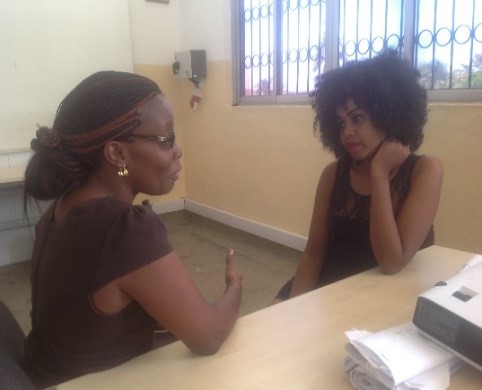 Key results of the formative in-depth interviews with sex workers and clients were presented at the 21th International AIDS Conference in Durban, South Africa in four poster presentations. In June-July, a baseline cross-sectional survey was conducted among 160 female sex workers, 160 male sex workers, 80 clients of female sex workers and 80 clients of male sex workers in three bars where the intervention will be tested, and three bars that will serve as control. The intervention will start in September 2016, and combine activities to promote safe sex, such as peer mobilization, skits, videos shows and condom fashion shows, with moonlight clinics offering sexual health counselling, HIV testing, STI care, contraception, TB screening and ART adherence counseling, and with structural components, such as training of bar staff, meetings with bar managers and law enforcement sensitization. After 6 to 7 months, we will evaluate its feasibility, and the exposure to, and appreciation of, the intervention activities among the target populations.
Key results of the formative in-depth interviews with sex workers and clients were presented at the 21th International AIDS Conference in Durban, South Africa in four poster presentations. In June-July, a baseline cross-sectional survey was conducted among 160 female sex workers, 160 male sex workers, 80 clients of female sex workers and 80 clients of male sex workers in three bars where the intervention will be tested, and three bars that will serve as control. The intervention will start in September 2016, and combine activities to promote safe sex, such as peer mobilization, skits, videos shows and condom fashion shows, with moonlight clinics offering sexual health counselling, HIV testing, STI care, contraception, TB screening and ART adherence counseling, and with structural components, such as training of bar staff, meetings with bar managers and law enforcement sensitization. After 6 to 7 months, we will evaluate its feasibility, and the exposure to, and appreciation of, the intervention activities among the target populations.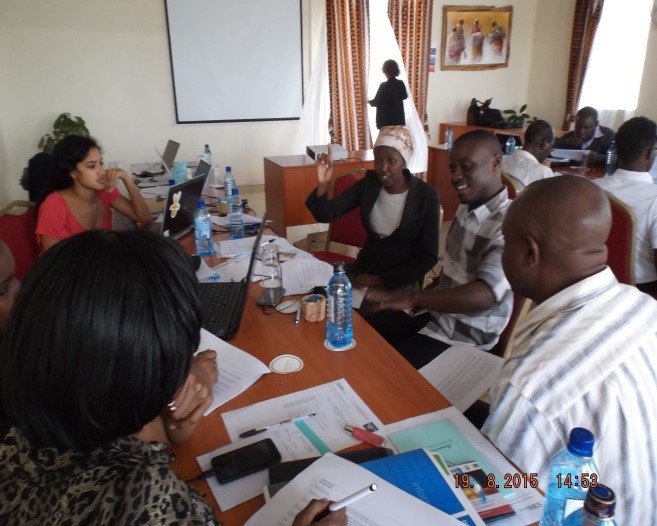 he end of the intervention.
he end of the intervention.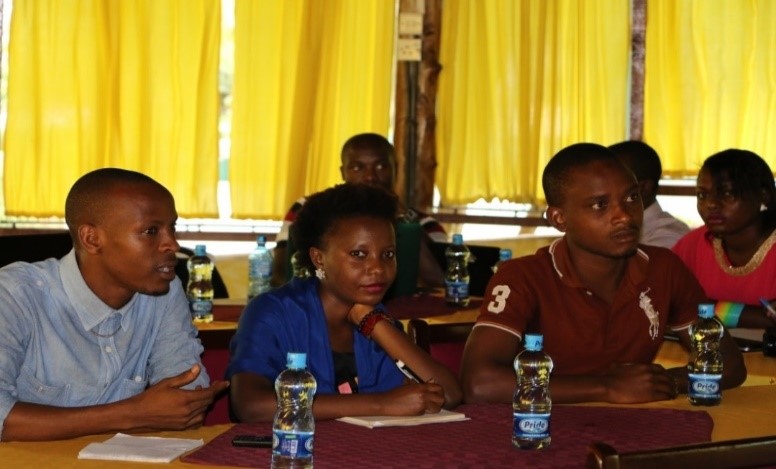 ICRHK in partnership with UNFPA supported the launch of the national Adolescent Sexual and Reproductive Health Policy in Kilifi and Mombasa Counties of the Kenyan Coast.
ICRHK in partnership with UNFPA supported the launch of the national Adolescent Sexual and Reproductive Health Policy in Kilifi and Mombasa Counties of the Kenyan Coast.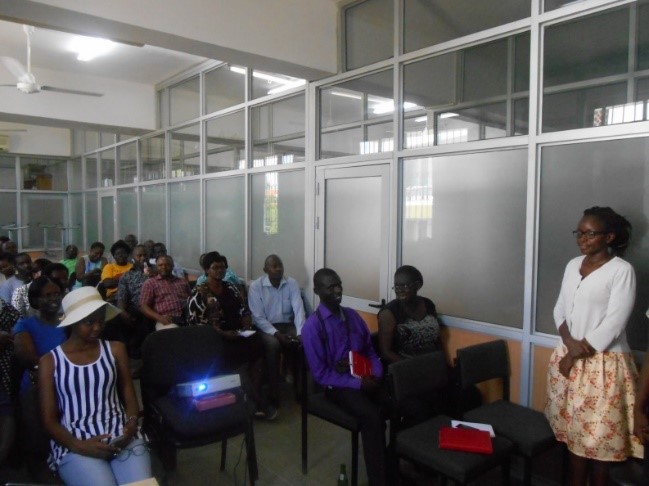 h the UPTAKE & WHISPERS study both aiming at addressing the unmet needs of family planning targeting the general community in Kilifi County and Female Sex Workers in Mombasa respectively.
h the UPTAKE & WHISPERS study both aiming at addressing the unmet needs of family planning targeting the general community in Kilifi County and Female Sex Workers in Mombasa respectively.